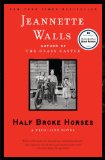Summary | Excerpt | Reading Guide | Reviews | Beyond the Book | Readalikes | Genres & Themes | Author Bio

A True-Life Novel
by Jeannette Walls
Afterward, I was pretty aggravated with Mom. She kept saying that the flood was God's will and we had to submit to it. But I didn't see things that way. Submitting seemed to me a lot like giving up. If God gave us the strength to bail -- the gumption to try to save ourselves -- isn't that what he wanted us to do?
But the flood turned out to be a blessing in disguise. It was all too much for that tenderfoot, Mr. McClurg, who lived up the draw in a two-room wooden house that he had built with timber he carted in from New Mexico. The flood washed away Mr. McClurg's foundation, and the walls fell apart. He said he'd had it with this godforsaken part of the world and decided to return to Cleveland. As soon as Dad got home from Austin, he had us all jump in the wagon and -- quickly, before anyone else in High Lonesome got the same idea -- we drove over to scavenge Mr. McClurg's lumber. We took everything: siding, rafters, beams, door frames, floorboards. By the end of the summer, we had built ourselves a brand-new wooden house, and after we whitewashed it, you almost couldn't tell that it had been patched together with someone else's old wood.
As we all stood there admiring our house the day we finished it, Mom turned to me and said, "Now, wasn't that flood God's will?"
I didn't have an answer. Mom could say that in hindsight, but it seemed to me that when you were in the middle of something, it was awful hard to figure out what part of it was God's will and what wasn't.
I asked Dad if he believed that everything that happened was God's will.
"Is and isn't," he said. "God deals us all different hands. How we play 'em is up to us."
I wondered if Dad thought that God had dealt him a bad hand, but I didn't feel it was my place to ask. From time to time, Dad mentioned the horse kicking him in the head, but none of us ever talked about his gimp leg or his trouble speaking.
Dad's speech impediment did make it sound a little like he was talking underwater. If he said, "Hitch up the carriage," it sounded to most people like "Ich'p uh urrj," and if he said, "Mama needs to rest," it sounded like "Uhmu neesh resh."
Toyah, the nearest little town, was four miles away, and sometimes when we went there, the kids followed Dad around imitating him, which made me want to thrash them something fierce. A lot of times, particularly when Mom was there, too, Buster, Helen, and I could do little more than glare at them. Dad usually acted like those kids didn't exist -- after all, he could hardly run for his gun to shoot them, like he had with that tinker -- but once, at the Toyah stable, when a couple of them were especially loud, I saw him glance down with a wounded look. While he and Buster were loading the wagon, I went back to the stable and tried to explain to those kids that they were hurting people's feelings, but all they did was snicker, so I shoved them into the manure pile and ran. I'd never done a bad thing that gave me so much satisfaction. My only regret was that I couldn't tell Dad about it.
What those kids didn't understand about Dad was that, although his speech did sound sort of marbly, he was smart. He'd been taught by a governess, and he was all the time reading books on philosophy and writing long letters to politicians like William Taft, William Jennings Bryan, and Frederick William Seward, who had been Abraham Lincoln's assistant secretary of state. Seward even wrote back, letters Dad treasured and kept in a locked tin box.
When it came to the written word, no one could string together sentences like Dad. His handwriting was elegant, if a little spidery, and his sentences were long and extravagant, filled with words like "mendacious" and "abscond" that most of the folks in Toyah would need a dictionary to understand. Two of Dad's biggest concerns in his letters were industrialization and mechanization, which he felt were destroying the human soul. He was also obsessed with Prohibition and phonetic spelling, both of which he saw as cures for mankind's tendency toward irrational behavior.
Excerpted from Half Broke Horses by Jeannette Walls. Copyright © 2009 by Jeannette Walls. Excerpted by permission of Simon & Schuster. All rights reserved. No part of this excerpt may be reproduced or reprinted without permission in writing from the publisher.
Your guide toexceptional books
BookBrowse seeks out and recommends the best in contemporary fiction and nonfiction—books that not only engage and entertain but also deepen our understanding of ourselves and the world around us.